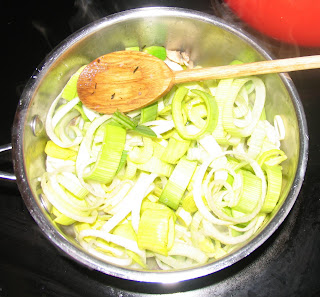I went to an acupuncture appointment yesterday and it reawakened an interest in Eastern Medicine and using foods to heal. I had to go on a very strong medication for a couple months, and I'm having various symptoms (nausea, irritability, abdomenal pain, etc.) and the acupuncturist picked up on how cold I'm running right now. In Eastern Medicine, yin and yang is a very important concept. Balance is key, and certain foods will help balance a person's heat or cold. These attributes will impact everything from behavior to pain patterns. Foods run cold, warm, or neutral, and selecting foods that complement a person's current constitution can help with health issues. Cooking temperature and time also impact heat versus cold. I was interested in the theory that low temperatures over a long period of time are considered more warming than high temperatures for a short period of time. Chewing thoroughly can also help neutralize mildly cold foods, as can cutting finely.
 Leeks are a warming food and very friendly to those with candida.
Leeks are a warming food and very friendly to those with candida.They are great sweated down in a pan and then mixed with other veggies.
This evening I cooked up a big batch of mustard greens with garlic and some parsnip pancakes with scallions. It was a very satisfying dinner and for once I'm not nauseated and feel satiated. I have better energy than yesterday and my stomach isn't as distended, but that is the extent of relief I've experienced so far. I'm excited to continue with my warm diet and acupuncture. Friday I'm planning on getting my blood work done to check liver and kidney levels (fingers crossed!). I'm hopeful that I'm turning a new leaf and finding new energy to develop recipes.
In other news, Lance got a new job and is sticking to his gluten free diet. Annie has been doing well and playing well with Champ. I'm looking at new car options and trying to remain environmental conscious and stick to vegan values (has anyone else noticed it's harder to get new cars without leather seats????). We bus to and from work all week, but I would like a reliable car for medical emergencies and camping trips.


I have been to a chinese doctor/acupuncturist and I have found the list of foods to be helpful. It's one of the reasons I have gravitated to more cooked vegan foods. Raw made me too cold.
ReplyDeleteQuest ion and sorry if you've covered this - how were you diagnosed with your health issues? A mainstream doctor? A natural doctor? Or did you just kind of figure it out yourself? I'm just curious because I have a few random symptoms (one of them that my stomach can get so bloated), and I know there are several things that could be causing it and not sure which. My mainstream doctor thinks I'm cuckoo obviously. I haven't had good luck trying elimination diets...I'm so weak :0...but there are things I've cut out completely but nothing really changes it...I need to just stop worrying about the money and go to a doctor who might really be able to help.
ReplyDeleteAllergies and food intolerances (essentially another inappropriate immune response) are still not accepted by everyone in the medical community. Mild food allergies (unlike many peanut and seafood allergies) are viewed as an inconvenience - something you can choose to observe or not. I would maintain that ignoring these things causes inflammation, which can be damaging. They are extremely hard to ferret out on your own through elimination diets. I would stop eating an ingredient for a couple weeks and find no change - it turned out I was allergic to a list of things. Only after eliminating all of them did I feel any better. It also might be as simple as taking digestive enzymes, a small change in food prep, or probiotics
ReplyDeleteI'll get off my soap box. My conventional doctor was very sympathetic, and acknowledged I had some scary symptoms, which were later diagnosed as systemic lupus by a rheumatologist. I went to a doctor that specialized in Environmental Medicine to get diagnosed with allergies. He used a provocative skin test, which is controversial (but I find extremely effective). I took a blood test as well prior to the skin test, and it did catch a number of allergies. If you go to a naturopath and they do a blood test for allergies, make sure they order the IGE/IGG test. IGE is the immediate reaction associated with allergies like peanuts. IGG is a longer reaction associated with mast cell activity/intolerances. This is the "allergy" that is most common for me and my symptoms range from arthritis increase to bloating to asthma and rash.
If you want more information about Environmental Medicine, or the allergy tests available, please feel free to email me at thediscerningkitchen (at) gmail.com
Thank you; I might get back to you about it at some point.
ReplyDelete